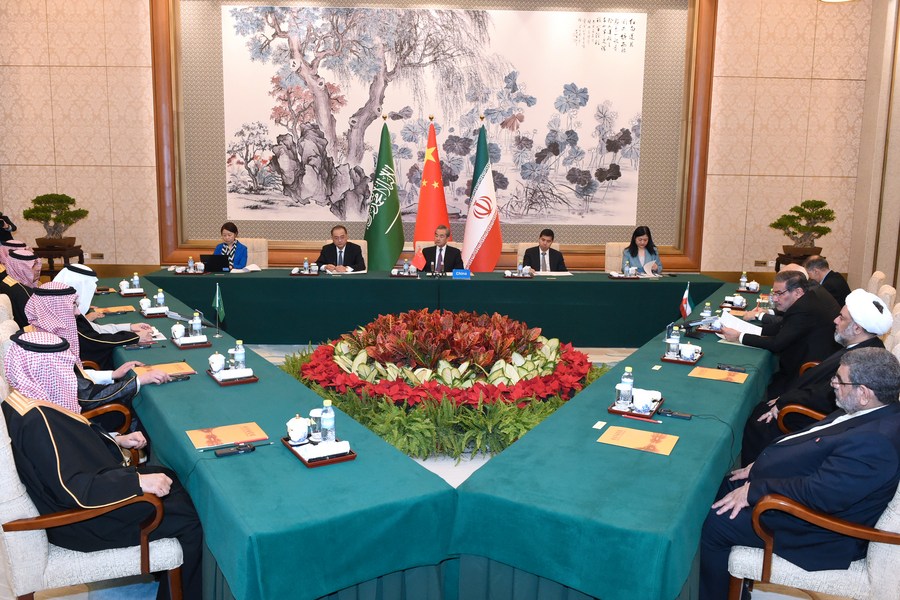
Wang Yi, a member of the Political Bureau of the Communist Party of China (CPC) Central Committee and director of the Office of the Foreign Affairs Commission of the CPC Central Committee, presides over the closing meeting of the talks between a Saudi delegation and an Iranian delegation in Beijing, capital of China, March 10, 2023. (Xinhua/Luo Xiaoguang)
CAIRO, April 10 (Xinhua) -- As world leaders welcomed the resumption of diplomatic relations between Saudi Arabia and Iran -- two arch-rivals in the Middle East -- some U.S. officials have expressed their displeasure instead of joining the celebration.
In an unannounced visit to Saudi Arabia earlier this month, William Burns, director of the Central Intelligence Agency, aired Washington's "frustration" at being left out of regional developments after Riyadh moved to restore ties with Iran and Syria, according to The Wall Street Journal.
Burns' frustration came about a month after the China-brokered Saudi Arabia-Iran talks, during which the two sides agreed to resume diplomatic relations. The two Mideast countries signed a joint statement in Beijing on Thursday to reopen embassies and consulates in their respective countries.
The deal is expected to ease tensions between the two influential Muslim countries, so that they could work together to reduce armed conflicts and restore stability and peace for tens of millions of people in the region.
When most of the world welcome the move, it doesn't seem to be good news for Washington, where any diplomatic effort of China could be interpreted as evidence of malign intent and an attempt to hurt U.S. interests.
Such a mindset has resulted in the indiscriminate use of U.S. power to contain China and sabotage any project that China takes part in, including peacemaking and other initiatives for the world's common good.
In addition to its own harsh sanctions imposed on Chinese technology firms, Washington has also coerced its allies and some other countries to join the sanctions and reject projects in which China had a stake.
In the case of the Saudi-Iranian deal, the United States was not in a good position to broker such a rapprochement as it has no diplomatic ties with Iran.
U.S. politicians refuse to face the reality that they -- after being a key player in the Middle East for decades -- now find themselves absent from an agreement which could bring significant changes in the region.
Moreover, as many analysts have pointed out, Washington may not be very interested in building a peaceful Middle East since it has long taken advantage of the region's conflicts and made a fortune out of it.
By inciting conflict between Iran, against which Washington has already imposed harsh sanctions, and other countries in the region, the United States could make its Mideast allies more reliant on it on security matters, and benefit from this situation by selling weapons to them.
Over the years, U.S. politicians have been trying to shape the geopolitics of the Middle East by aligning with allies, isolating governments they deemed to be hostile, widening the Arab-Iranian and Israeli-Iranian divide through a complex scheme, and entangling the region in its influence.
Yet, these tactics are full of loopholes. Rigorous sanctions on important regional players will leave little room for U.S. policymakers to maneuver when a dialogue is needed, and excessive interference in the crucial decisions of its allies to advance its own interests may backfire.
The Saudi-Iran deal could serve as a reminder for Washington to reconsider its confrontational foreign policy and its zero-sum game approach to international affairs.
U.S. politicians has been obsessed with doing everything it can to help maintain its hegemony, regardless of the consequences of their decisions and actions.
For too long, they have taken it for granted that intimidations, sanctions and other economic penalties are a show of strength. But quite contrary to what they had wished for, keeping doing so would eventually alienate U.S. allies and erode U.S. power in a fast-changing world where most people yearn for pragmatic cooperation instead of confrontations. ■












